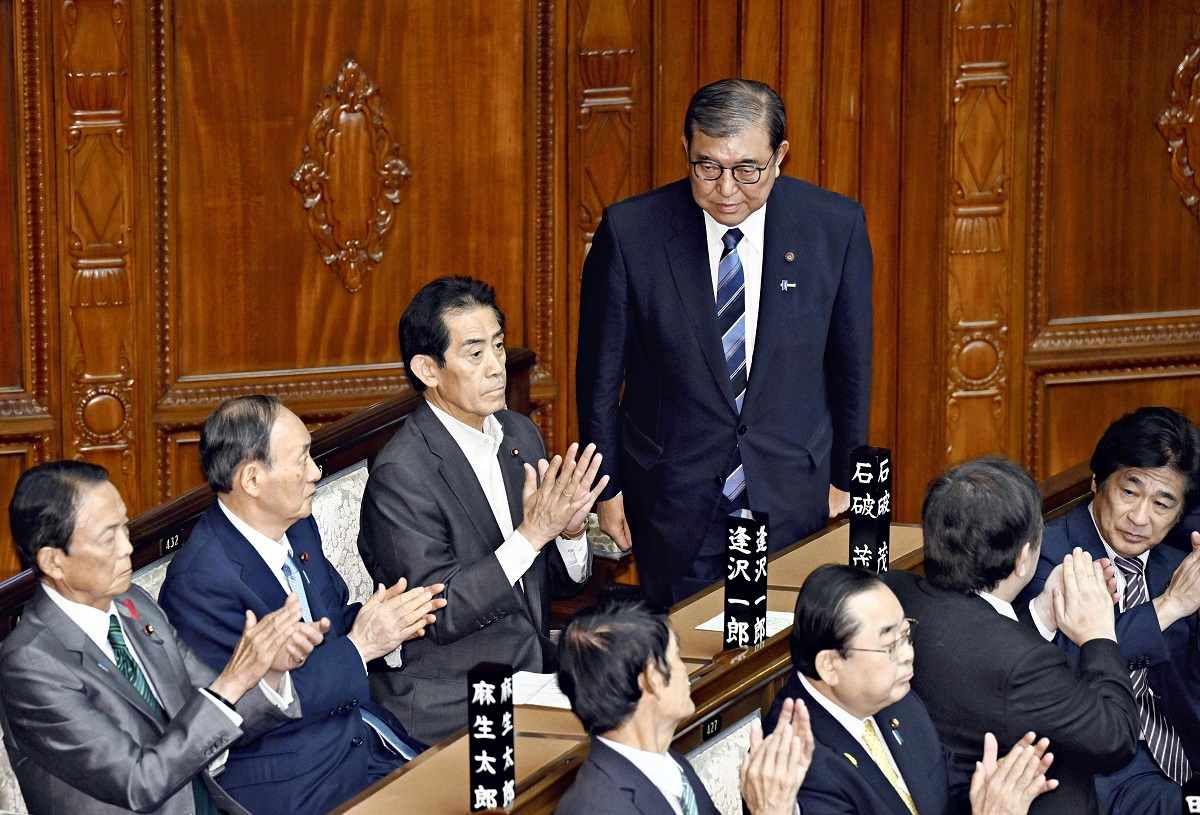Shigeru Ishiba Named Japan’s PM, Forms Cabinet with 13 Rookie Ministers; Cabinet Veterans Tapped as Defense, Foreign Ministers

Shigeru Ishiba rises and gives a slight bow during an extraordinary session of the House of Representatives on Tuesday after being named prime minister.
18:20 JST, October 1, 2024
Liberal Democratic Party President Shigeru Ishiba was named the new prime minister Tuesday afternoon at plenary sessions of both houses in an extraordinary Diet session that was convened on the day.
He immediately began forming his Cabinet, which was to be launched Tuesday night.
The new Cabinet will focus its efforts on restoration and reconstruction in the areas affected by the Noto Peninsula Earthquake and the vitalization of local economies, among other issues.
Ishiba intends to dissolve the House of Representatives on Oct. 9 and hold a lower house election with the official start of the campaign on Oct. 15 and the voting and ballot counting on Oct. 27.
On Tuesday morning, Ishiba made a final coordination on the formation of the Cabinet with LDP executive members and others at the party headquarters.
Both chambers of the Diet held respective votes to name the prime minister on Tuesday afternoon. After being named prime minister, Ishiba met with Keiichi Ishii, leader of the LDP’s coalition partner Komeito, and they agreed to maintain the coalition government.
The new Cabinet was to be officially launched on Tuesday night after the investiture ceremony for Ishiba and the attestation ceremony for newly appointed ministers at the Imperial Palace.
Ishiba was to hold a press conference that night to explain his administration’s basic policies and major policy agendas.
The new Cabinet’s lineup has been announced. Thirteen people took cabinet posts for the first time.
Takamaro Fukuoka, chairperson of the LDP Policy Board in the House of Councillors, was appointed as health, labor and welfare minister. Hideki Makihara, a former senior vice minister of economy, trade and industry, was named justice minister. Masaaki Taira, a former senior vice minister of the Cabinet Office, was appointed as digital minister.
Those who retained their posts are Chief Cabinet Secretary Yoshimasa Hayashi and Tetsuo Saito, the land, infrastructure, transport and tourism minister.
Former Chief Cabinet Secretary Katsunobu Kato, who was a candidate in the recent LDP presidential race, was named finance minister, while Ryosei Akazawa, a senior vice minister of finance, was named as minister in charge of economic revitalization. Akazawa also takes charge of preparing for the establishment of a ministry that Ishiba intends to create to deal with disasters.
Former Defense Minister Takeshi Iwaya was named foreign minister, and Gen Nakatani, also a former defense minister, was appointed as defense minister again.
There are two female Cabinet members: Toshiko Abe, a senior vice minister of education, culture, sports, science and technology, was appointed as education, culture, sports, science and technology minister, and Junko Mihara, a former senior vice minister of health, labor and welfare, was named minister for measures for declining birthrate.
The extraordinary Diet session will likely last for nine days through Oct. 9. Counting from when a new prime minister takes office, a lower house dissolution in just eight days and voting and ballot counting for a lower house election in 26 days will be the shortest time periods for both events since the end of World War II.
Related Tags
Top Articles in Politics
-

Japan PM Takaichi’s Cabinet Resigns en Masse
-

Sanae Takaichi Elected Prime Minister of Japan; Keeps All Cabinet Appointees from Previous Term
-

Japan’s Govt to Submit Road Map for Growth Strategy in March, PM Takaichi to Announce in Upcoming Policy Speech
-

LDP Wins Historic Landslide Victory
-

LDP Wins Landslide Victory, Secures Single-party Majority; Ruling Coalition with JIP Poised to Secure Over 300 seats (UPDATE 1)
JN ACCESS RANKING
-

Producer Behind Pop Group XG Arrested for Cocaine Possession
-

Japan PM Takaichi’s Cabinet Resigns en Masse
-

Japan Institute to Use Domestic Commercial Optical Lattice Clock to Set Japan Standard Time
-

Man Infected with Measles Reportedly Dined at Restaurant in Tokyo Station
-

Israeli Ambassador to Japan Speaks about Japan’s Role in the Reconstruction of Gaza





















